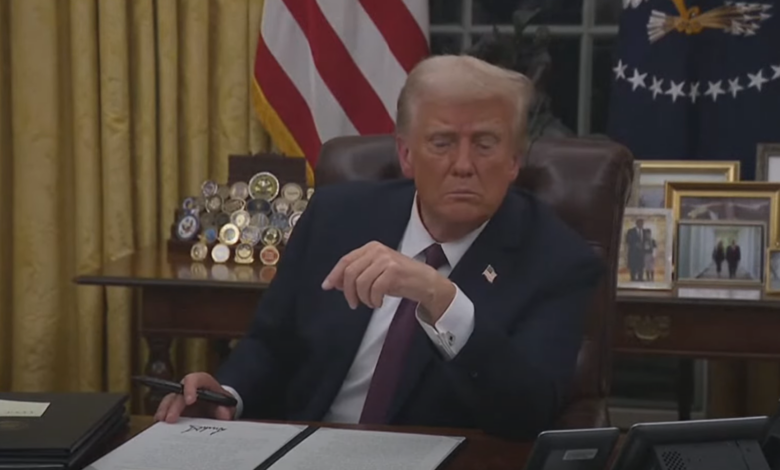
Trump’s Administration Reconsiders Crypto Strategy with Influential Summits
The administration of U.S. President Donald Trump is reconsidering its approach to cryptocurrency regulation. Instead of establishing a formal “Crypto Council,” the government is reportedly opting for a series of informal summits. This shift, initially reported by Unchained Crypto on February 13, seems to be a tactical move to address strategic policy purposes and manage internal frictions within the rapidly evolving digital asset landscape.
Informal Summits Take Center Stage
According to Unchained, three insiders familiar with the administration’s strategic planning have suggested that these proposed summits will delve into specific policy challenges. These topics are expected to encompass a spectrum of issues, including banking, payment systems, data center management, and Bitcoin (BTC) mining operations.
Unchained’s report highlighted, “The Trump administration is unlikely to launch a formal ‘crypto council’ but is expected to convene a rotating group of crypto leaders for a series of summits focused on specific crypto policy issues.” While the precise number and timing of these summits remain uncertain, two sources mentioned that industry trade associations are actively involved in shaping the format and topics of discussion.
Avoiding Internal Power Struggles
The consideration of these ad hoc summits appears to be a strategic maneuver by the Trump administration to sidestep potential power struggles within the diverse crypto ecosystem. The digital asset sphere is increasingly fragmented, comprising factions such as “Bitcoin maximalists,” decentralized finance (DeFi) advocates, supporters of centralized exchanges, and various other groups with unique perspectives on integrating digital assets with traditional finance.
Initially, there was an expectation in the digital asset community regarding the formation of a “presidential Council of Advisers for Digital Assets (the ‘Crypto Council’).” This anticipation was fueled by a December announcement from President Trump on Truth Social, where he spoke of creating an advisory group featuring leading figures from the crypto industry.
The initial proposal envisioned Crypto and AI Czar David Sacks as the chair, with former congressional candidate Bo Hines as the executive director. Though Hines has maintained a low profile since December, one unnamed source indicated that he has been actively engaging with lawmakers and lobbyists in Washington to explore alternative approaches. According to this source, the summits present a “no-brainer way to have America’s brightest minds weigh in on their areas of expertise.”
Mixed Reactions and Speculations
While some view this pivot as a strategic decision, others remain skeptical. Unchained’s coverage included remarks from an anonymous source who suggested that the summits could be “purely a way to avoid conflict” and might serve as a means for Trump to gather insider information for personal financial gain. Another source criticized Trump’s personal crypto ventures, such as the TRUMP memecoin and involvement in World Liberty Financial, labeling them as “an embarrassment.”
Recently, The New York Post revealed potential candidates for the Trump administration’s Crypto Council. The list included prominent industry figures like former Kraken general counsel Marco Santori, Ripple co-founder Brad Garlinghouse, podcast host Frank Chaparro, Circle CEO Jeremy Allaire, Coinbase CEO Brian Armstrong, and Crypto.com CEO Kris Marszalek.
Ripple’s Role Under Scrutiny
Further fueling the rumors, Andrew Parish (@AP_Abacus), founder of x3, shared a statement from a purported insider. Parish posted on X: “It should be obvious by now. Sources confirmed late last night: ‘Ripple pressed too hard; no chance XRP makes it into any federal-level reserve,’ and ‘Focus remains on Bitcoin and the best path to an SBR… SBR isn’t simple, will take time; have to avoid the law of unintended consequences… Trump is smart, trusts Bitcoin first thesis.’”
These insights suggest that Ripple’s lobbying efforts—or perceived overreach—could be influencing the Trump administration’s reluctance to involve Ripple prominently in governmental discussions. Nonetheless, Parish’s assertions are based on anonymous sources and lack official verification.
Numerous figures in the Bitcoin community have shared their perspectives on these developments. Julian Fahrer, co-founder of Apollo, remarked on X: “Trump is considering abandoning the Crypto Council. Not surprising. Imagine what Ripple’s contribution has been so far: ‘Here’s our plan for dumping XRP on the American people in perpetuity.’ Shocking that this brain trust isn’t working out!”
Similarly, Steven Lubka, Head of Swan Private, commented on X: “Ripple’s posturing may have derailed the entire crypto council, with Trump leaning towards summits instead.”
As of the latest update, XRP was trading at $2.54.







